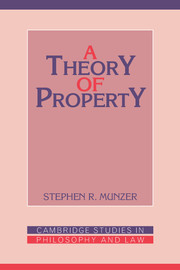Book contents
- Frontmatter
- Contents
- Preface and acknowledgments
- 1 Property, justification, and evaluation
- Part I Property rights and personal rights
- Part II From individuals to social context
- 4 Incorporation and projection
- 5 Control, privacy, and individuality
- 6 Property and moral character
- 7 Alienation, exploitation, and power
- Part III Justification and distributive equity
- Part IV Applications
- Table of cases
- Index of names
- Index of subjects
6 - Property and moral character
Published online by Cambridge University Press: 05 June 2012
- Frontmatter
- Contents
- Preface and acknowledgments
- 1 Property, justification, and evaluation
- Part I Property rights and personal rights
- Part II From individuals to social context
- 4 Incorporation and projection
- 5 Control, privacy, and individuality
- 6 Property and moral character
- 7 Alienation, exploitation, and power
- Part III Justification and distributive equity
- Part IV Applications
- Table of cases
- Index of names
- Index of subjects
Summary
FOUR CLAIMS
To illuminate property on the path from individuals to social context, it is necessary to expand the inquiry. Chapter 4 concluded with a provisional discussion of personality. Chapter 5 then related property to the personal goods of control, privacy, and individuality. These were not, however, specifically moral goods and revealed little about moral character. If one is to appreciate the connections between property and moral character, one must say something about virtues and vices and about the links between property and character traits in different kinds of societies.
This chapter examines some connections between property and moral character. It does not deal with virtue as a possible justifying argument for private property, and it does not contend that private property is either a necessary or a defeating condition for having a good moral character. Rather, the chapter makes four main claims. First, even the briefest consideration of Plato, Aristotle, Kant, and Adam Smith yields some key points regarding property and moral character. Second, the republican tradition in political theory helpfully supplements, but should not replace, these key points. Third, different sorts of economic systems promote, and inhibit, somewhat different sorts of property-related-virtues and vices. Fourth, the ideal of a person who has exactly the right character traits in relation to property is a highly problematic ideal. Before one can argue for these claims, though, it is necessary for the sake of clarity to say something about virtues, vices, and moral character.
- Type
- Chapter
- Information
- A Theory of Property , pp. 120 - 147Publisher: Cambridge University PressPrint publication year: 1990



